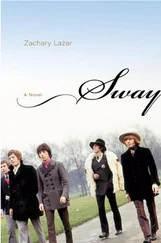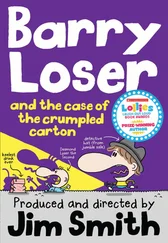2.
I went to visit my father a few days later. He lives now on 72nd Street, about eight blocks from where we’d lived when I was growing up. When the elevator door opens on the third floor, even when you know what to expect, the light-filled spaciousness can still come as a surprise. The living room, like a vast hall, has three different groupings of sofas and chairs — it even has one of those peculiar circular couches, usually seen in hotel lobbies, with a tall bouquet at the center like the pistil in a giant lotus. Floor lamps, framed etchings, a bronze boddhisattva standing lankily in a far corner. In the room he uses as his study, he switched off the TV and I told him about my lunch with Gila. He listened inattentively, eating cold beef consommé out of a bowl.
“She lives in Sag Harbor,” I said. “Like she’s been trying to get back there ever since that weekend.”
He wiped his hands on a large napkin, licking his teeth. “She came in to say hello about a year ago,” he said. “Right before I closed up the shop. She had cancer, she told me. They didn’t know yet how serious it was. Maybe she just didn’t want to tell me.”
“You never told me you saw her.”
“Once or twice over the years she came in to say hello.”
He was even less interested in my meeting with Gila than I’d expected him to be. I understood then that he seldom if ever thinks about her, just as, in the wake of all the trouble I brought him when I was younger, he seldom thinks of me. I made it hard for him — I frustrated and ultimately baffled him. He had only wished me well all those years. I was so accusative for so long that in his eyes that’s who I am now, no matter how often we see each other.
He had other problems to think about in any case. A few months before this, his name had appeared in a newspaper story along with the name of a longtime partner of his — an antiques dealer in London — who had been accused of fraud. The dealer in London had sold a consignment of English furniture to a dealer in Switzerland. My father had negotiated with this Swiss dealer to sell some of the English furniture to clients in New York. The consignment of furniture, falsely valued at over three million dollars, turned out to contain several forgeries. My father has claimed repeatedly that he had no idea about this. He “flatly denies” knowing anything about it, as the newspaper put it.
He showed me an elegant piece of furniture that afternoon — it was the massive desk in his study. It had belonged to his best friend, Harry Klein, he told me, the friend whose boat we used to go on when I was young. After Klein’s death, his wife, Deborah, had found herself in financial trouble, their assets worth far less than she’d believed. The desk, my father pointed out, had ebony marquetry and fleur-de-lis spandrels flanked by pilasters carved like acanthus leaves. It was called a partners desk, he told me. There were kneeholes on all four sides of its mahogany bulk so that four bankers could sit together in the sepia light and go over accounts. He didn’t know where the Kleins had found it. He asked me how much I thought it was worth, and I told him I had no idea. He said that Deborah Klein had lived with the desk for almost twenty years. It had made her feel a certain way about herself, about her life with Harry. They’d had a set of Hepplewhite chairs, a French commode from the eighteenth century, this partners desk from a famous workshop in England, Marsh & Tatham. After Harry’s death, the finances unraveled. Deborah had had to sell the house in Southampton, the house I’d visited as a girl. When she asked my father for his help with the antiques, he’d had to tell her, after she’d already lost so much, that the desk too wasn’t worth anything like what she’d thought. There were faded spots in the wood in places light would never have hit it. It was a fake — it had been cobbled together from scraps of other old pieces of furniture. My father gave her seventy-five thousand dollars for it, more than it was worth. She hadn’t spoken to him since. She’d thought the desk was worth four times that. In Deborah Klein’s mind, the desk was worth more than their friendship.
“You don’t talk about yourself very much,” I said.
“No. Not really.”
“You think it’s tasteless?”
“Something like that.”
“Maybe that’s why I’m curious. Because of the tastelessness.”
“I don’t think about the past very much. I try not to.”
“Why?”
“My parents never talked about the past. My grandparents didn’t. The past was what you were trying to get away from. You understand why.”
“No.”
“Because we came from nowhere. Because we were no one. That’s why. Part of becoming someone is not having to talk about your past. I couldn’t talk about it now if I wanted to. I don’t know anything about it.”
He had something else he wanted to share with me that afternoon, a kind of family heirloom, which he presented to me there in the study. His brother Jacob had recently passed on some recordings made by their father — my grandfather — who died before I really knew him. My grandfather had built up a chain of jewelry stores which were then fought over after his death by his two eldest sons, my uncles. They turned the chain of stores into rival boutiques that have since become famous. My father won’t set foot in either of them. He feels judged by his brothers, I think, because they have made even more money than he has. I say all this, and yet after a lifetime in his company, I don’t really know him. He is probably unknowable. When he says he has no information about the past, I believe him. It would have been not just personal shame his family felt, but also the greater shame of having left behind an impoverished world that eventually was exterminated. It wasn’t something people talked about. Very likely, it wasn’t even possible to talk about it.
He wanted to play me these recordings. He explained that his father would sometimes amuse his sons by hosting a mock radio show which he would capture on an old-fashioned gramophone that cut actual records, small shellac discs that could then be played back. My uncle had kept hundreds of these discs in storage and finally had them preserved on CDs. My father is in his midseventies now. He bent over the stereo with a scowl that looked angry but was really only reflexive, the face he wears when concentrating. He wore what he almost always wears in summer, a dress shirt with French cuffs, linen trousers, polished shoes. His hands shook a little. He stood there stooped over the CD player as the recordings began.
The first track was a kind of clownish singing, slightly embarrassing to hear. It was an old Broadway tune I didn’t know, the lyrics adjusted into puns about my grandfather’s jewelry store. My uncle — I assume it was my uncle singing — added a few bars of “The Tennessee Waltz” for some reason, letting his voice break like a yodeling cowpoke’s. Then my grandfather asked some questions of another little boy in the style of a journalist:
Who is the best singer in the world?
I don’t know.
Caruso?
I don’t know.
My father turned and looked at me, his hand pressed against his lower back. His new wife has a house in Connecticut, an old family house, and she spends most of the weekends there. I don’t think he would have been playing me these recordings if she was around. She’s been around less and less since the accusations appeared in the newspaper.
“It’s you,” I said, meaning the voice of the little boy.
“Nineteen forty. Nineteen forty-one. Sometime before the war, I’m pretty sure.”
“You sound happy.”
He shrugged. I think he sensed already that I was going to write him into this book. He knew it before I did, as if my disloyalty was never in doubt. His shrug was like his resigned way of urging me not to. He had come as far a distance as Gila Konig had, I think he was telling me with that shrug. Not as a victim but as a self-invention. Not as a yored, but as one of the olim— no one was more ascended than my father in his Upper East Side town house, a world away from the Brownsville slum of his own father’s youth. He had no interest in the yordim. I’m sure he wondered why I did.
Читать дальше












